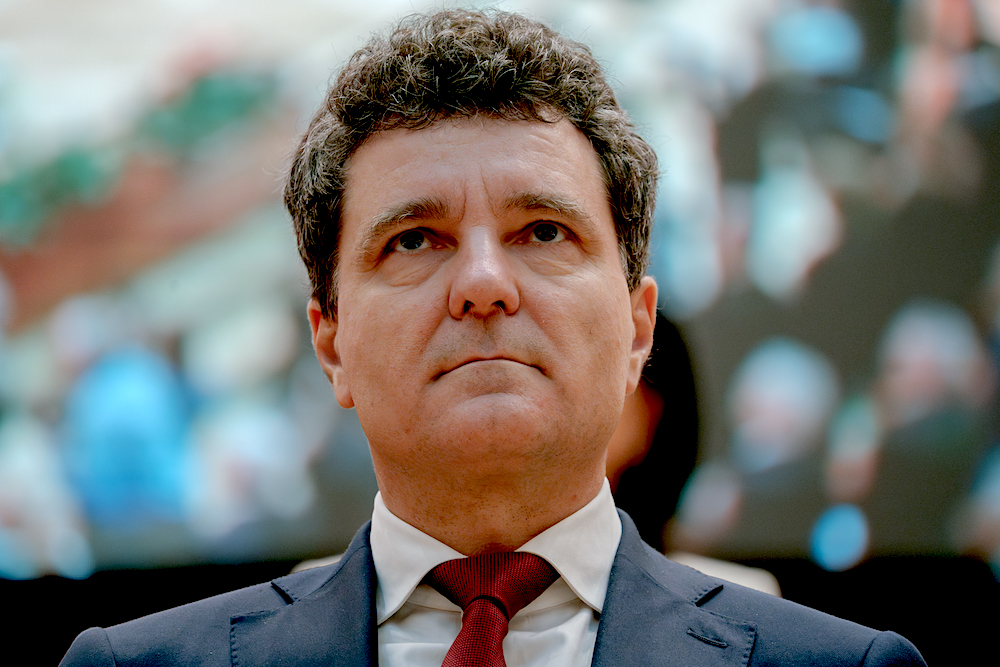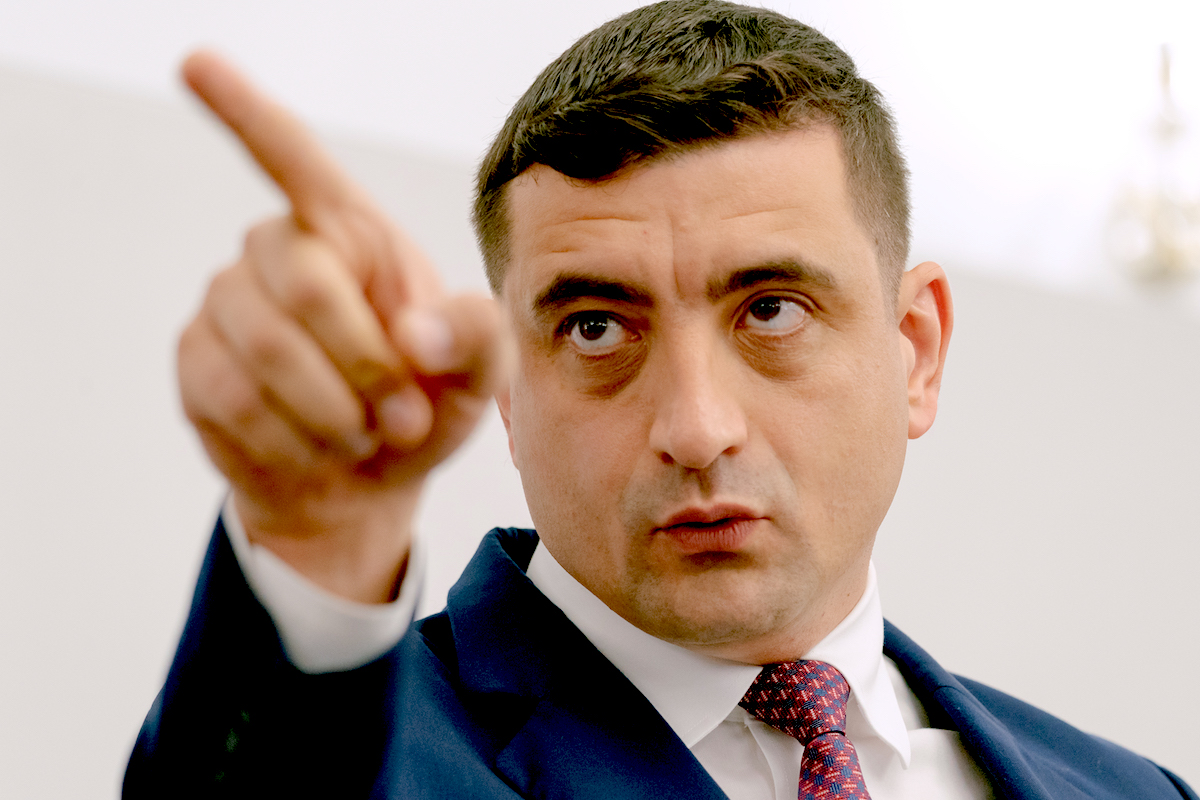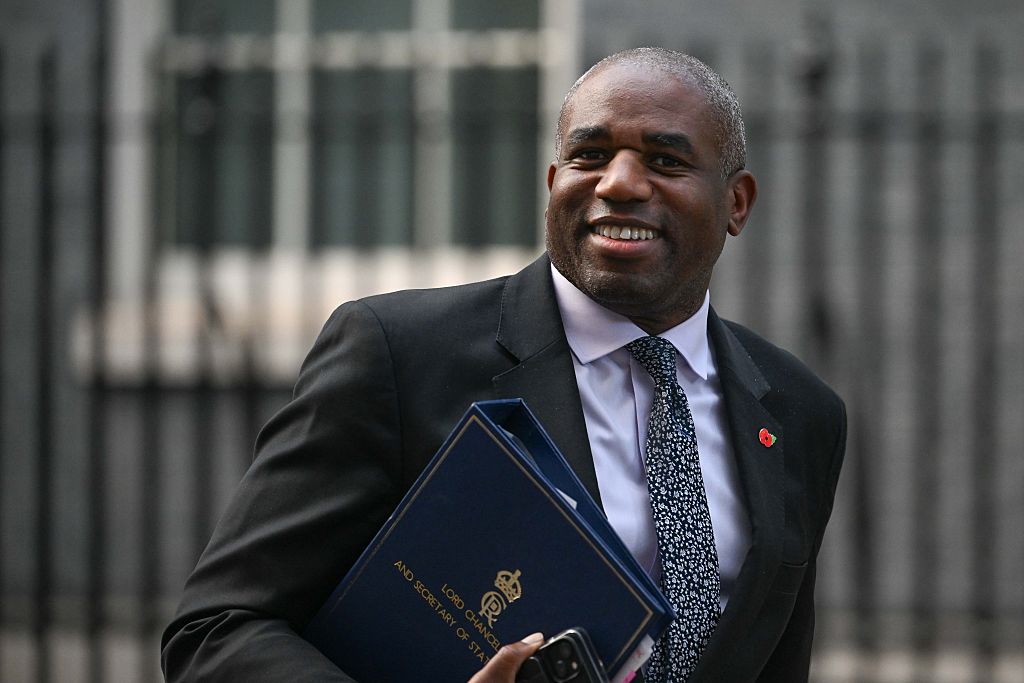Bucharest, Romania
Surely it’s only a matter of time before someone writes Children of the Deal: a portrait gallery of populists, showmen and media-savvy impresarios moulded in Donald Trump’s image. When that book appears, George Simion may well warrant the opening chapter.
In the basement of a Lebanese restaurant in central Bucharest, he holds court, poised to become Romania’s next president. ‘This is Romanian,’ he says, waving a hand over the mezze. ‘Like the Gulf of America… I’ll have an executive order to declare it Romanian.’
The room laughed. So did Simion. He was joking. Probably.
Simion is not, by any conventional measure, a traditional politician. A former football ultra and church-going Orthodox Christian, he is now the leader of Romania’s nationalist opposition.
Having just won the first round of Romania’s presidential election, he was suddenly the bookies’ favourite.
Simion lounges like a man who’s already measured the curtains at Cotroceni. He wears a blue hoodie bearing the slogan ‘Red is Bad’, from a Polish anti-communist clothing brand. Around him, the room hums with journalists, aides, and a procession of nationalist fellow-travellers. ‘Hermanos!’ he calls to one group. ‘Grazie mille!’ to another. Occasionally, he reverts to plain English: ‘Greetings, Polish friends.’
A loose alliance of conservatives, bound by their opposition to globalism and what they see as the West’s moral decay, had flown in to lend Simion their support. Le Penists mingled with Maga missionaries and populist broadcasters from across the continent. Also present, somewhat improbably, was Jorgen Boassen, Trump’s most enthusiastic admirer in Greenland (not, admittedly, a crowded field).
That week, Simion had criss-crossed between European capitals, meeting fellow populists and courting diaspora votes. In Paris, he tore into Emmanuel Macron’s ‘tyrannical tendencies’ on live television. ‘Smashed them,’ a broadcaster told him approvingly, as Simion spooned olives onto his plate.
His pugilistic style made even seasoned right-wingers blush. Giorgia Meloni and Marion Maréchal teased him afterwards: ‘You’re behaving like Trump!’ Simion has been called worse. ‘There’s no time for political correctness in politics,’ he told his guests, as if the room needed reminding. ‘This is the message of the people. That makes us populists.’
If populism is candour, Simion may be the real thing. Between bites of salad and sips of lemonade, he cracked jokes, admitted he was ‘no angel’ at school, and spoke of his ‘wicked, evil enemies’ around the world, before returning, inevitably, to Macron.
‘Mr Macron,’ he said, half-laughing, ‘has many, many soldiers. He’ll send them to Greenland. He’ll send them to Ukraine.’
He smirked. ‘He’s a little Napoleon – and Napoleon was really little.’
For Macron, the joke is no laughing matter. Romania shares Nato’s longest border with Ukraine. Its Black Sea coast faces Russia’s naval theatre. It also hosts Nato’s soon-to-be-largest European base, and France has stationed thousands of troops in the country. Losing Romania to a swaggering Eurosceptic is, from the Elysée’s point of view, not an option.
Macron made the point with typical understatement. ‘This is not a blank check,’ he warned Elena Lasconi, a pro-European presidential candidate. ‘We provided support to a country clearly committed to the EU and to Nato.’
Romania’s centrist establishment went a step further. In December, the country’s presidential election was annulled by the courts, the first aborted vote in EU history.
The timing was highly suspect. It coincided with the rise of another populist, Calin Georgescu, who had won the first round comfortably and had floated a referendum on EU and Nato membership.
Georgescu’s lifestyle and politics are esoteric in the extreme. A judo black belt, he has expressed admiration for Romania’s 1930s fascist legionnaires, the American Founding Fathers, and Vladimir Putin. He has warned of a transhumanist, paedophilic cabal and dismissed Covid-19 as a ‘plandemic’.
Simion models himself more on Giorgia Meloni than Viktor Orban
In March, he was barred from running again over claims that Russia intervened in his favour via TikTok, an allegation that remains unsubstantiated.
Into the vacuum stepped Simion: less overtly radical, more media-savvy, and still close enough to Georgescu to inherit his base. He even pledged to make Georgescu prime minister.
Simion has often been caricatured as a Kremlin stooge. In reality, it’s not Moscow that keeps Brussels up at night, it’s Washington. Simion wants to cut back support for Kyiv and forge a bilateral relationship with the US, just as America’s commitment to Ukraine and Europe appears to be cooling.
He models himself more on Giorgia Meloni than Viktor Orban: a nationalist Atlanticist, if such a thing exists, aligned with an ascendant European right more welcome in Washington than in Brussels.
But the vision remains unmistakably local. He speaks of reuniting with Moldova (though Moldova has banned him from the country), regaining control of Romania’s oil and gas, and luring back expats with subsidies. ‘Like Poland did,’ he says.
His support runs deepest in the countryside, among the poor, the uneducated and the devout, who are highly mistrustful of elites. A constituency easily reached through TikTok and a ring light. During lunch, he occasionally scrolls.
How long does he spend on social media?
‘Eight hours a day,’ he says matter-of-factly. ‘In 2020 we entered the parliament without access to mainstream media – no TV shows. But we took 9 per cent of the vote using only my Facebook account.’
‘Now, TikTok is more powerful.’
His feed is a steady stream of affirmation, which he consumes voraciously. ‘It helped me to relax during the campaign,’ he tells me. ‘We had long days with lots of harassment from our adversaries. Before I went to sleep, I’d open TikTok for half an hour or one hour and saw all the supportive videos Romanians were making. It made me feel better. It made me feel powerful. And it helped me a lot – for the morale, it was the best thing you could do.’
He’s taken that to heart. He reads the comments, posts directly, and hands out his number to journalists. His politics seem to emerge from the feedback loop: a kind of direct digital democracy.

His face lights up at the mention of his fans. ‘Very funny, very creative people, the Romanians,’ he says. ‘One comment said: Ilinca, my wife, is ironing my shirts for me because on Monday he will be the president.’
But one wonders, with all those hours spent staring into the screen, whether it might be staring back. His rhetoric often feels memetic. He’s posted videos declaring ‘Fuck all globalists!’ and, citing TikTok trends over lunch, he suggested Romania’s Hungarian minority might vote for him. They didn’t.
He calls himself a democrat, though he dismisses democracy as a ‘fallacy’ and speaks admiringly of El Salvador’s soft autocrat, Nayib Bukele.
Like Bukele, Simion is charismatic: warm, witty, and, as one comrade put it, ‘very high IQ.’ He also claims to have ADHD. ‘I’m glad I was born in 1986, before it was discovered. People left me to be energetic,’ he said.
His intellectual habits are debated. One adviser says his office is stacked with Romanian histories. Another suspects he doesn’t read books at all, relying instead on social media, and occasionally ChatGPT.
It sometimes shows. ‘I will fight with you until my last drop of blood for your right to disagree with me,’ he declared over lunch, attributing the apocryphal Voltaire line to Churchill. ‘That’s democracy, as he understood it. And as I understand it.’
Compared with Georgescu – an urbane, well-read, former UN agronomist – Simion offers a cruder strain of nationalism. Georgescu quoted Jefferson and dreamed of building a ‘Hamiltonian powerhouse’ in Eastern Europe, economically sovereign and debt-free.
That vision struck a chord. When communism collapsed in 1989, Romania opened for business while much of the country still farmed. Foreign capital flowed in, but rural Romanians were largely left behind. Georgescu promised sweeping reforms, ‘about the whole system,’ as one approving taxi driver put it.
‘They think I’m the dictator. Your guy annulled elections!’
But neither Georgescu nor Simion has much to offer the other Romania – middle-class Bucharesters who see their futures tied to Europe.
‘I don’t know how to reach out to those people who think they are European,’ Simion admitted during lunch. ‘We have generations educated through Netflix, who are paid by multinational companies; who see their future as European citizens first, not as Romanians first. They are from my generation, and well educated.
‘It is frustrating for me that they don’t get it; that they are humiliating my voters; they say they don’t have teeth; they should go to a dentist; and they shouldn’t be allowed to vote. This is not very democratic.’
He added: ‘They think I’m the dictator. Your guy annulled elections. And I’m the dictator?’
Simion’s final opponent, Nicusor Dan, was the embodiment of that other Romania: a Sorbonne-trained mathematician seeking closer ties to Europe. In their only debate, Dan stayed focused, while Simion floundered, later mocking Dan as ‘autistic.’
The insult did little to ingratiate him with the Bucharest swing vote. Dan rode the anxiety of the Anywheres to victory. Bucharest, waving EU flags, celebrated the result like a second revolution. One woman in the crowd told me Simion was a ‘football hooligan’ backed by Putin.
I caught Dan at 2 a.m. ‘The decision to cancel the first election was the correct one’, he said, hinting there was more to it than an establishment stitch-up. He didn’t elaborate, but promised transparency largely to reassure Washington – where, as he noted, support for his opponent had been rather muted.
And Simion? He was still posting. Within 48 hours, he declared victory, conceded defeat, blamed foreign interference, and called for the result to be overturned.
In the end, he may be remembered not as Romania’s Trump, but as a prototype: one of the first truly viral politicians of Eastern Europe.
In a region where history moves fast, that may turn out to matter more than it seemed last week.
A man-made meme, perhaps. But also a meme-made man.








Comments